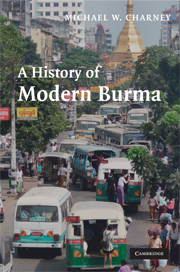Book contents
- Frontmatter
- Contents
- List of figures
- List of maps
- Chronology
- Abbreviations
- Introduction
- Chapter 1 Burma under colonial rule
- Chapter 2 The colonial center
- chapter 3 Self-government without independence, 1937–1947
- Chapter 4 The democratic experiment, 1948–1958
- Chapter 5 Dress rehearsals, 1958–1962
- Chapter 6 The Revolutionary Council
- Chapter 7 The BSPP years
- Chapter 8 Toward democracy, 1988–1990
- Chapter 9 Perpetual delay, 1990 to the present
- Conclusion
- Notes
- Readings
- Index
Chapter 2 - The colonial center
Published online by Cambridge University Press: 05 February 2015
- Frontmatter
- Contents
- List of figures
- List of maps
- Chronology
- Abbreviations
- Introduction
- Chapter 1 Burma under colonial rule
- Chapter 2 The colonial center
- chapter 3 Self-government without independence, 1937–1947
- Chapter 4 The democratic experiment, 1948–1958
- Chapter 5 Dress rehearsals, 1958–1962
- Chapter 6 The Revolutionary Council
- Chapter 7 The BSPP years
- Chapter 8 Toward democracy, 1988–1990
- Chapter 9 Perpetual delay, 1990 to the present
- Conclusion
- Notes
- Readings
- Index
Summary
Rangoon was not colonial Burma’s only urban center, nor the only center for British settlement, administration, or commercial operations. Different centers had been important at earlier stages of colonial rule, such as Akyab and Moulmein, while Mandalay played a role in the north – though to a lesser degree – akin to that of Rangoon in the south. However, Rangoon was the most significant center for the colony as a whole as well as the colonial capital.
More importantly, Rangoon was a foreign city erected on Burmese soil. It was here, to the exclusion of anywhere else save for a few hill stations, that Burmese life was thoroughly pushed to one side. In its imposing architecture, its physical arrangement, its landscaped gardens, its focus on the harbor and maritime trade, the ethnic division of its population, and in many other ways, Rangoon was a mimeograph of dozens of port cities scattered throughout colonial South and Southeast Asia. A person only had to squint to be confused as to whether he or she was standing in Singapore, Penang, Calcutta, or elsewhere.
- Type
- Chapter
- Information
- A History of Modern Burma , pp. 18 - 45Publisher: Cambridge University PressPrint publication year: 2009
- 1
- Cited by



